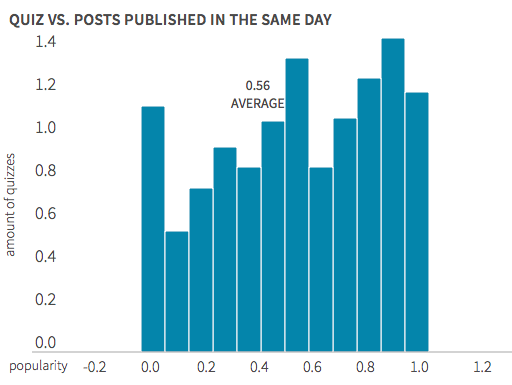Stop Talking to Yourself!
Pop Quiz: Will a quiz perform better than a longform article on your site? What about a video or slideshow?
Owen Fuller, chief evangelist at Boombox, knows that the internet is becoming more interactive. His company provides a litany of tips, tricks, and formats to create easy-to-use quizzes and polls that anyone can use on their media site (even us!).
But even though digital publishers are getting creative about how they’re presenting information on their site, Fuller cautions that posting a quiz isn’t a silver bullet if you’re not making those quizzes (or slideshows, or videos) with your audience in mind.
In fact, according to the data from our network of nearly 400 publishers and 40 billion events tracked monthly, quizzes showed almost no signs of being more popular or better received by audiences.

Where is the Disconnect?
Just because you are asking your audience to engage with you through a particular format doesn’t mean you can ignore the content. As Rand Fishkin has said: “Good, unique content isn’t enough.” Fuller’s Boombox has extended this as a core principle of its company: “Be remarkable or die.” In this case, that means making sure format, content and audience all coalesce for every piece that passes through to publish.
When outlets take advantage of insights from data about their audience and combine that with an engaging format that they see massive results, like the ones mentioned in Boombox’s blog post on quizzes that have done exceptionally well.
Two well known examples that they cite include:
- “What City Should You Actually Live In?” from BuzzFeed
- “How Y’all, Youse and You Guys Talk” from the New York Times
Why did those quizzes work? In the BuzzFeed example, Summer Anne Burton told a crowd at Parse.ly event that the first quizzes they tried did not work with their audience, but they used data about the audiences reactions to keep iterating, until they found one that hit it big.
And in the NYTimes’ case, the quiz’s author, Josh Katz, knew exactly why the topic resonated with readers:
“Dialect is all about people’s sense of identity — ‘this is who I am, this is where I come from,’”
The Future of Quizzes
Of course, quizzes are still a very small part of Parse.ly’s data (they only make up around 0.05 percent of all posts), and analyzing interactive content is especially difficult because many digital publishers are not even tagging posts in a way that allows them to access this type of insight. So there’s lots of room for quizzes to grow in use by publishers, not to mention understand and improve their performance.
Still, rather than shooting arrows in the dark, digital publishers must start having a conversation with readers, both explicitly through interactive formats and implicitly, by taking the time to understand the readers’ preferences through data.
Watch the full webinar we did with Boombox over on their blog.